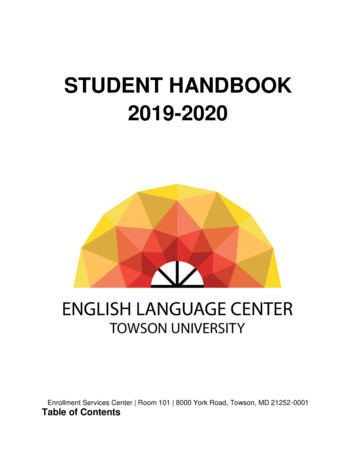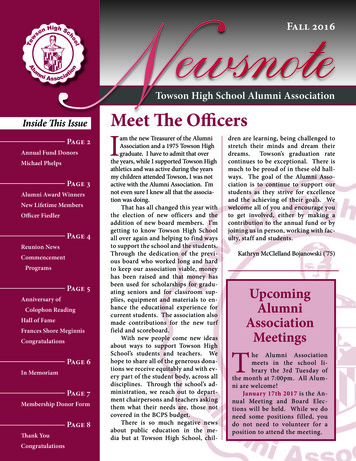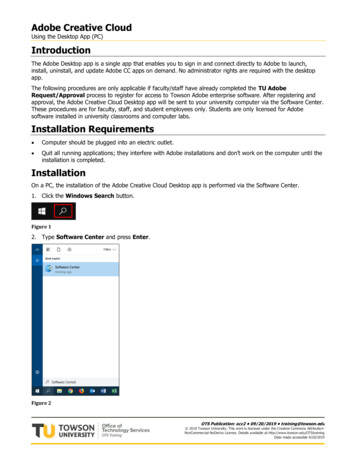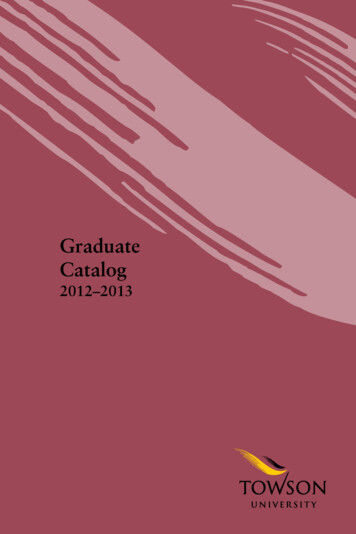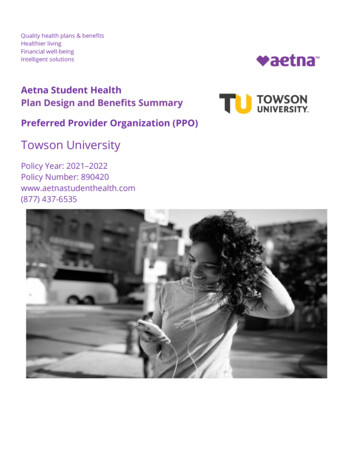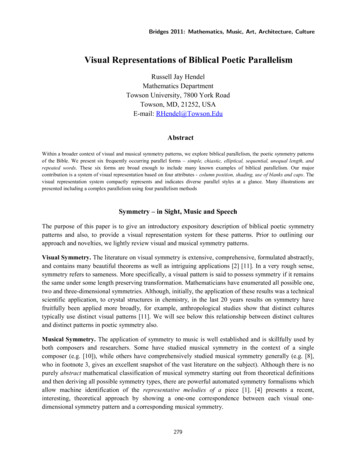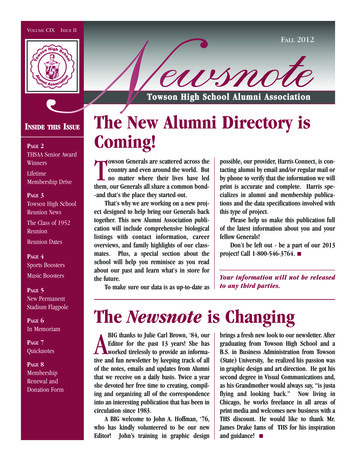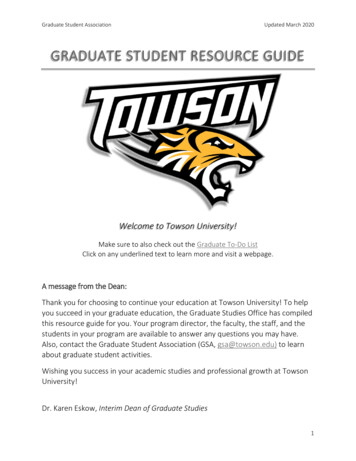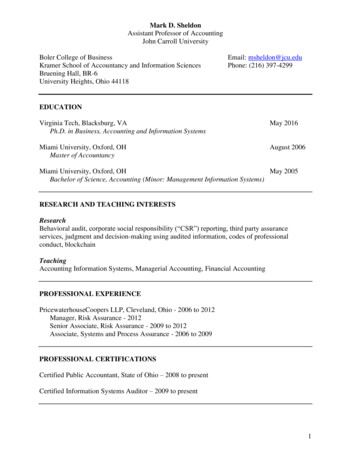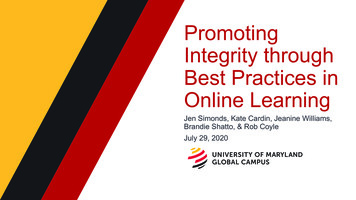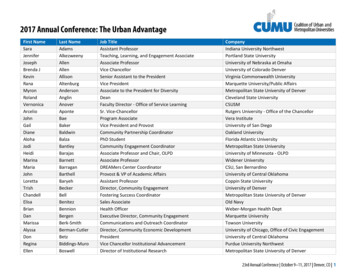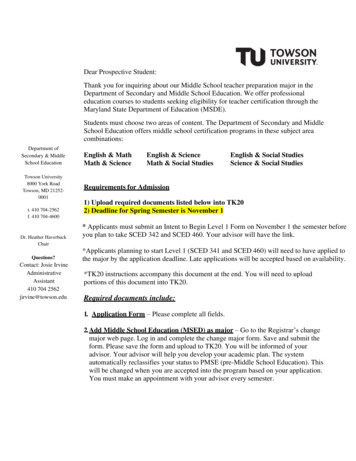
Transcription
Dear Prospective Student:Thank you for inquiring about our Middle School teacher preparation major in theDepartment of Secondary and Middle School Education. We offer professionaleducation courses to students seeking eligibility for teacher certification through theMaryland State Department of Education (MSDE).Students must choose two areas of content. The Department of Secondary and MiddleSchool Education offers middle school certification programs in these subject areacombinations:Department ofSecondary & MiddleSchool EducationTowson University8000 York RoadTowson, MD 212520001t. 410 704-2562f. 410 704-4600Dr. Heather HaverbackChairQuestions?Contact: Josie IrvineAdministrativeAssistant410 704 2562jirvine@towson.eduEnglish & MathMath & ScienceEnglish & ScienceMath & Social StudiesEnglish & Social StudiesScience & Social StudiesRequirements for Admission1) Upload required documents listed below into TK202) Deadline for Spring Semester is November 1* Applicants must submit an Intent to Begin Level 1 Form on November 1 the semester beforeyou plan to take SCED 342 and SCED 460. Your advisor will have the link.*Applicants planning to start Level 1 (SCED 341 and SCED 460) will need to have applied tothe major by the application deadline. Late applications will be accepted based on availability.*TK20 instructions accompany this document at the end. You will need to uploadportions of this document into TK20.Required documents include:1. Application Form – Please complete all fields.2. Add Middle School Education (MSED) as major – Go to the Registrar’s changemajor web page. Log in and complete the change major form. Save and submit theform. Please save the form and upload to TK20. You will be informed of youradvisor. Your advisor will help you develop your academic plan. The systemautomatically reclassifies your status to PMSE (pre-Middle School Education). Thiswill be changed when you are accepted into the program based on your application.You must make an appointment with your advisor every semester.
3. Essay- Using your experience with children, schools, and teachers, discussyour desire to teach and its importance to your future. Limit: One and a half totwo pages (double-spaced).4. Transcripts –All of your transcripts should appear in your PeopleSoft Student Center.5. Meet the Maryland State Department of Education Basic Skills Requirement.For information go ee/certification/testing info/praxis1.aspxYou can also use a search engine and search key words: Maryland State Departmentof Education Basic Skills Requirement.Always keep a copy of test scores. You will need them for teaching.6.Criminal History Disclosure Statement –Signed7.Professional Behavior Policy—Read the entire document. Complete and sign thelast two pages and submit it with the application. The Assistance Plan is includedfor your review. You and your PDS Liaison would engage this form in the eventof needed discussions for your support. Do not include it with your application.8. Acceptance Notification - If you meet the requirements, we will notify you by email within 14 business days after submission. If you do not meet therequirements, we will notify you by e-mail along with recommendations. If you donot meet the required GPA, the recommendation is for you to take undergraduatecourses (such as those listed in #9 below) until you have met 3.0 GPA.9. Courses you may take - In anticipation of being accepted into the program, youmay register for Introductory Education Classes listed in the document titled“Required Education Courses. Anyone may register for these classes, as they donot require department permission. The courses are: SCED 304 Education, Ethics, and Change (3) SCED 305 Adolescent Learning, Development, and Diversity (3) ISTC 301 Integrating Instructional Technology (3) SPED 301 Introduction to Special Education K-12 (3)10. Final Internship (Student Teaching) Requirements Completion of All Coursework 3.00 minimum GPA in your major/content field 3.00 minimum GPA overall 3.00 minimum GPA in professional education courses11. TU Foundation Scholarships Applications due by the last business day in JanuaryThere are over 75 College Of Education-specific TU Foundation Scholarshipsto be awarded every academic year. To apply, submit the Towson Universityonline centralized application. It's a one-time application that will find availablescholarships based on eligibility. Apply today!
MIDDLE SCHOOL EDUCATION MAJORAdministered by The Department of Secondary & Middle School EducationRequired Education CoursesREQUIREMENTS Department permission is not required. Any student may register for these classes.EDUC 202Historical And Contemporary Perspectives on America’s Urban Schools (3) (Core #10)EDUC 203Teaching and Learning in A Diverse Society (3) (Core #13)SCED 304Education, Ethics, and Change (3) (Core #14)INTRODUCTORY COURSES Department permission is not required. Any student may register for these classes.ISTC 301 Integrating Instructional Technology (3) Prerequisite: None.May be taken before being admitted to program or throughout the programSCED 305SPED 301Adolescent Learning, Development, and Diversity (3)Introduction to Special Education K-12 (3) Prerequisite: None.May be taken before being admitted to program or throughout the programProgram CoursesStudents must be accepted into the major and meet the Maryland State Department of Education Basic SkillsRequirement. For information go e/certification/testing info/praxis1.aspxLEVELMSED 342MSED 4601MSED 499LEVEL2Internship in Middle School Education (6) Application Required.Taken at Professional Development Schools (PDS) immediately prior to Final Internshipand concurrent with Methods of Teaching Major Subject and MSED 461MSED 461Teaching Reading in the Middle School Content Area (3)Methods of Teaching Major Subject (3) Required 2.75 GPA.Each subject area is rotated within one semester.Methods of Teaching Major Subject (3) Required 2.75 GPA.Each subject area is rotated within one semester.English MSED 367 Mathematics MATH 424 & 425Science SCIE 381Social Studies MSED 365MSED 401LEVEL3Principles of Middle Level Education (4) –field experience included, transportation/traveltime required. Taught off-campus in a middle school.Using Reading and Writing in the Secondary School (4) taken concurrent with MSED 342Taught off-campus in a middle school.Analyzing Student Teaching (3)FINAL SEMESTERStudent Teaching- All classes must be complete before entering final semester.FINAL INTERNSHIP (6)FINAL INTERNSHIP (6)English MSED 383Science MSED 393Mathematics MSED 426Social Studies MSED 389MARYLAND STATE DEPARTMENT OF EDUCATION – Teaching Certificate RequirementPRAXIS II Student must take and pass both Middle School Praxis II test for certification.5047: Middle School: English/Language Arts5169: Middle School: Mathematics5440: Middle School: Science5089: Middle School: Social StudiesThere is no pedagogy test required for Middle School certification in the state of MarylandSTUDENT TEACHING GPA REQUIREMENTS: 3.0ProfessionalYear
Middle School Major – Required Content CoursesEnglish Content Required CoursesAmerican LiteratureENGL 238SURVEY OF AMERICAN LITERATUREBritish LiteratureSelect one of the following:ENGL 221BRITISH LITERATURE TO 1798ENGL 222BRITISH LITERATURE SINCE 1798Diversity in American Literature Select one of the following:ENGL 233SURVEY OF AFRICAN-AMERICAN LITERATUREENGL 234MAJOR WRITERS IN AFRICAN-AMERICAN LITERATUREENGL 235ETHNIC-AMERICAN LITERATUREENGL 236AMERICAN INDIAN LITERATURE, 1772-PRESENTENGL 239MODERN JEWISH LITERATURELinguistics and GrammarENGL 251APPLIED GRAMMARWorld Literature/Non-Western Literature Select one of the following:ENGL 243INTRODUCTION TO CLASSICAL MYTHOLOGYENGL 244WORLD FOLKLOREENGL 248LITERATURE OF GLOBAL EXPERIENCEENGL 341HISTORY AND LITERATURE OF THE OLD TESTAMENTENGL 342FOLKLORE AND LITERATUREENGL 343MYTH AND LITERATUREENGL 347WORLD LITERATURE WRITTEN IN ENGLISHAdvanced Writing Select one of the following:ENGL 310WRITING ARGUMENTENGL 313ACADEMIC ESSAYENGL 316WRITING ABOUT LITERATUREWMST 333WOMEN'S WORDS, WOMEN'S LIVESAdolescent LiteratureSCED 419YOUNG ADULT LITERATUREContent MethodsMSED 367TEACHING LANGUAGE ARTS IN THE MIDDLE SCHOOLTotal UnitsMathematics Required CoursesMATH 215RATIONAL NUMBERS AND PROPORTIONAL REASONING FOR MIDDLE SCHOOLMATHEMATICS TEACHERSMATH 225ALGEBRA AND NUMBER CONCEPTS FOR MIDDLE SCHOO TEACHERSMATH 235STATISTICS AND PROBABILITY FOR THE MIDDLE SCHOOL TEACHERMATH 255GEOMETRY FOR MIDDLE SCHOOL TEACHERSMATH 273CALCULUS IMATH 325MATHEMATICAL PROBLEM SOLVING FOR MIDDLE SCHOOL TEACHERSContent MethodsMATH 424SCHOOL-BASED METHODS FOR MIDDLE SCHOOL MATHEMATICS TEACHINGMATH 425MATHEMATICS TEACHING IN THE MIDDLE SCHOOLTotal UnitsScience Required CoursesBIOL 120PRINCIPLES OF BIOLOGY [LECTURE]& 120Land PRINCIPLES OF BIOLOGY [LAB]BIOL 301FIELD AND NATURAL SCIENCECHEM 121&CHEM 121LALLIED HEALTH CHEMISTRY I LECTURE & ALLIED HEALTH CHEMISTRY I LABORATORYUnits33333333244444432328434GEOG 101PHYSICAL GEOGRAPHY3PHYS 205PHYSICS FOR MIDDLE SCHOOL TEACHERS3PHSC 206EARTH-SPACE SCIENCE FOR MIDDLE SCHOOL TEACHERS3SCIE 355TEACHING ENGINEERING DESIGN IN ELEMENTARY & MIDDLE SCHOOL SCIENCE2Content MethodsSCIE 381TEACHING SCIENCE AT THE MIDDLE SCHOOL LEVEL3Total Units25
Social Studies Content Required CoursesANTH 207CULTURAL ANTHROPOLOGYorANTH 209ANTHROPOLOGY OF AMERICAN CULTUREECON 201MICROECONOMIC PRINCIPLESGEOG 102WORLD REGIONAL GEOGRAPHYorGEOG 105GEOGRAPHY OF INTERNATIONAL AFFAIRSGEOG 109INTRODUCTION TO HUMAN GEOGRAPHYHIST 145HISTORY OF THE UNITED STATES TO THE CIVIL WARHIST 146HISTORY OF THE UNITED STATES SINCE THE CIVIL WARorHIST 102HISTORY OF EUROPEAN CIVILIZATION THROUGH 17th CENTURYHIST 160WORLD HISTORY BEFORE 1300HIST 161WORLD HISTORY SINCE 1300POSC 103AMERICAN NATIONAL GOVERNMENTSOCI 101INTRODUCTION TO SOCIOLOGYSOSC 401SOSC 401 Topics in Social ScienceContent MethodsMSED 365TEACHING SOCIAL STUDIES IN THE MIDDLE SCHOOLTotal Units3333333333333333
Dr. Heather Haverback, Chairhhaverback@towson.eduHawkins Hall 404 DQuestions? Please contact:Josie IrvineAdministrative AssistantHawkins Hall 404 F410–704–2562
Middle SchoolEducation MajorPost-BaccalaureateApplication Materials ChecklistUse the checklist to help you confirm that you are submitting a complete application.Application FormChange of Major PageEssayTranscript(s)Criminal History Disclosure Statement -- signedProfessional Behavior Policy -- signedUpload the above documents above into TK20
TOWSON UNIVERSITYDepartment Application FormComplete as a fillable form on your computer or handwritten in either blue or black pen.410-704-2562 OfficeHawkins Hall 404 FExpected Graduation Semester:Towson ID #:undeterminedCell Phone #:Last NameDOB:First NameTU Email AddressCurrent Address:Perm Address (if different):SELECT ONE:Home/Perm #:@students.towson.edu Personal Email AddressStreetCityStateStreetCityStateMIDDLESCHOOL MAJORSelect Two Areas of Study Below:ZipZipNOTE: Studentsare required toattend a mandatorymeeting prior tostarting SCED499. Meetings areusually held inSeptember andMarch of each year.Check with youradvisor.UNDERGRADUATESCED TRACK/CONCENTRATIONSelect One Area of Study eSocial ScienceSpanishSocial StudiesACADEMIC HISTORY: List all colleges and universities attended and GPA:Undergraduate College/UniversityStateDegree?Date Rcvd.Graduate College or UniversityStateDegree?Date Rcvd.GPAGPAThe mission of the Teacher Education Unit is to inspire, educate and prepare facilitators of active learning for diverse andinclusive communities of learners in environments that are technologically advanced.Below For Office Use Only:SCHOOLPTSrevised 1 / 2016HRSGPANotes:SCED ADVISORApplication Received:TotalPTSHRSGPAApplication Processed:
TOWSON UNIVERSITY COLLEGE OF EDUCATIONCRIMINAL HISTORY DISCLOSURE STATEMENT,AUTHORIZATION, WAIVER AND RELEASEStudent:Student ID No.:Please read carefullyAs a prerequisite to the placement of education majors in field experiences, the Code of Maryland Regulationsrequires students to complete the following Criminal History Disclosure Statement. Students are also requiredto update the information contained in this Disclosure Statement based on any changes in or additions to theircriminal history until the time they graduate or otherwise cease their enrollment at Towson **********************************************Have you ever been convicted of, pled guilty to nolo contendere with respect to, or received probation beforejudgment with respect to a crime against children, in Maryland or any other jurisdiction?As defined in Article 27, §35C of the Annotated Code of Maryland, a crime against children includes childabuse and sexual abuse of a child (see reverse side of this page). YOU NEED NOT PROVIDE ANYINFORMATION CONCERNING CRIMINAL CHARGES AGAINST YOU THAT HAVE BEEN EXPUNGED.NoYesHave you ever been convicted of, pled guilty or nolo contendere with respect to, or received probation beforejudgement with respect to, a crime of violence?Crimes of violence are defined in Article 27, §643B of the Annotated Code of Maryland (see reverse side ofthis page). YOU NEED NOT PROVIDE ANY INFORMATION CONCERNING CRIMINAL CHARGESAGAINST YOU THAT HAVE BEEN EXPUNGED.NoYesIf your answer to either of the preceding questions is yes, please explain fully – attach explanation to thisstatement, specifying the nature and date of the offenses(s), the name and location of the court(s) and thedisposition(s), or outcome(s), including the sentences(s) imposed, if any.I hereby declare and affirm under penalties of perjury that the contents of the foregoing Disclosure Statementare true and correct and complete to the best of my knowledge, information and belief.I understand that I am obligated, and hereby agree, to update the information contained in the DisclosureStatement based on any changes in or additions to my criminal history until such time that I graduate orotherwise cease my enrollment at Towson University. I also understand that the failure fully and accurately toRevised 9/24/2020
complete and update the Disclosure Statement could result in action being taken against me, includingremoval from a field placement and/or dismissal from Towson University.I hereby authorize Towson University and its agents, employees, and representatives to investigate, utilize anddisseminate the Disclosure Statement, and any information contained therein or derived therefrom, for any andall purposes associated with my field placement and educational profession in the State of Maryland or anyother jurisdiction.By my signature below, I hereby release, waive, discharge and exonerate Towson University and its agent,employees and representatives from any and all liability, loss, claims and/or damages of every nature and kindarising out of, or in any way related to, the Disclosure Statement, the information contained therein or derivedtherefrom, and the investigation, dissemination, or use thereof.(Signature)Printed Name of StudentDateLocal Address:Local Phone Number:§643B. Mandatory sentences for crimes of violence.§35C. Causing abuse to child.(2) Crime of violence defined; correctional institutionaldefined. - As used in this section, the term crime ofviolence means abduction; arson in the first degree;kidnapping; manslaughter, except involuntarymanslaughter; mayhem and maiming, as previouslyproscribed under §§ 384, 385, and 386 of this article;murder rape; robbery; robbery with a deadly weapon;carjacking or armed carjacking; sexual offense in the firstdegree; sexual offense in the second degree; use of ahandgun in the commission of a felony or other crime ofviolence; and attempt to commit any of the aforesaidoffenses; assault in the first degree; and assault with intentto commit a sexual offense in the first degree, and assaultwith intent to commit a sexual offense in the seconddegree, as these crimes were previously proscribe underformer § 12 of this article.The terms correctional institution includes PatuxentInstitution and a local or regional jail or detention center.(A)Revised 9/24/2020Definitions.(1) In this section the following words have the meanings indicated.(2) Abuse means:(i) The sustaining of physical injury by a child as a result of cruel or inhumanetreatment or as a result of a malicious act by any parent or other personwho has permanent or temporary care or custody or responsibility forsupervision of a child, or by any household or family member, undercircumstances that indicated that the child's health or welfare is harmed orthreatened thereby; or(ii) Sexual abuse of a child, whether physical injuries are sustained or not.(3) Child means any individual under the age of l8 years.(4) Family member means a relative of a child by blood, adoption, or marriage.(5) Household member means a person who lives with or is a regular presence in ahome of a child at the time of the alleged abuse.(6)(i) Sexual abuse means any act that involves sexual molestation orexploitation of a child by a parent or other person who has permanent ortemporary care or custody or responsibility for supervision of a child, or by anyhousehold or family member.(ii) Sexual abuse includes, but is not limited to:1. Incest, rape, or sexual offense in any degree;2. Sodomy; and3. Unnatural or perverted sexual practices.
POLICY for CONTINUANCE or REMOVAL from SCHOOL PLACEMENTSIn addition to academic preparation and teaching knowledge and skills, the teaching profession requiresnon-academic professional behaviors such as interpersonal skills, which are as critical to teaching successas those in the academic domain. The Education Program Professional Behavior Policy describes theprofessional behaviors expected of teacher candidates in all school placements. Candidates who fail todemonstrate appropriate professional behaviors, pedagogical skills, and mastery of content may beremoved from the field placement after other options have been explored.Students can be dismissed from a field or clinical placement if (1) a school leader/school personnel in theplacement school asks that the candidate not return to the school for any reason. School personnel whoask that a candidate be removed from the placement could be a teacher, a principal, or other schoolpersonnel. Candidates may also be removed from field or clinical placements because (2) the candidate isstruggling with professional behaviors, content knowledge, instructional delivery, lesson pacing,classroom management or other processes/procedures related to teaching. Removal procedures undereither circumstance are discussed below.1. School Based Dismissal:If a school leader and/or mentor teacher requests the removal of a candidate from a school placement, theplacement at that school ends immediately. The teacher candidate should proceed to Step 4 of thispolicy, if the dismissal is at the request of the school. If the candidate’s actions consist of illegalactivities, the school placement ends immediately and the candidate should proceed to Step 4 of thispolicy.2. Procedures for a Struggling Candidate:When a candidate encounters difficulty in the school placement, it is the university supervisor’sresponsibility to inform the candidate, in writing, that they are not meeting expectations and to specify thebehaviors, dispositions, knowledge, and/or skills that need remediation. Once informed of the area(s)requiring improvement, the candidate, with assistance from the university supervisor, is responsible fordeveloping an assistance plan addressing the areas needing improvement. After review, discussion andrevision of the proposed plan, the university supervisor, along with the mentor teacher and the candidate,will finalize and sign the assistance plan. The assistance plan must include the area(s) that needimprovement and the steps the candidate must follow to remediate those area(s) of need. The assistanceplan will also include a timeline that specifies how and when the candidate will be expected to address theidentified area(s) of need and the steps that will follow if the area(s) are not remediated within the timeframe. Each time the university supervisor and the mentor teacher observe the candidate, observationswill be written with specific references to the identified area(s) for improvement in the assistance plan andany progress being made in these areas. The university supervisor will give a copy of the assistance planto the Towson University department chair/program director so they are aware of the area(s) in which thecandidate is experiencing difficulty. A copy of the assistance plan should also be provided to the Centerfor Professional Practice so that office is aware the candidate may be not be continuing in the schoolplacement, which impacts both record keeping and payment or partial payment to mentor teachers.Should the candidate refuse to sign the assistance plan, the candidate will be removed from the schoolplacement and should proceed to Step 4 of this policy.3. Assistance Plan and Continuation in or Removal from a School Placement:University supervisor and mentor teacher responsibilities: The university supervisor (in thisdocument the term university supervisors also assumes PDS liaisons and field placement observers)Revised 11/2019Approved 11/19/2019
ensures that the mentor teacher has modeled appropriate planning, instruction, assessment, andprofessional behaviors and has involved the candidate in a gradual progression of appropriate classroomexperiences such as co-teaching, small group instruction, whole class instruction, and independentteaching, if that is warranted. The university supervisor is responsible for observing the candidate andproviding both oral and written feedback to the candidate and mentor teacher for each lesson observed.The mentor teacher must give written feedback to the candidate.3A. Successful Completion of the Assistance Plan: At the end of the time frame set forth in theassistance plan, if the candidate has successfully completed all parts of the assistance plan to thesatisfaction of the university supervisor and mentor teacher and is able to maintain all of theresponsibilities expected in the school placement, the candidate will continue in the placement. Successfulcompletion of the Assistance Plan does not indicate successful completion of the course, only the abilityto continue in the placement.3B. Unsuccessful Completion of the Assistance Plan: At the end of the time frame set forth inthe assistance plan, if adequate progress in the area(s) of need identified on the assistance plan is notachieved, the candidate will be removed from the school placement. This decision will be made by theuniversity supervisor in consultation with the mentor teacher and with communication to the schoolprincipal, and to the department chairperson/program director. The Center for Professional Practice willalso be notified in writing of the decision, so the office staff can amend the placement information forgraduation purposes and can determine the proper payment to the mentor teacher. Within two businessdays of the decision to remove an intern from a school placement, a letter written by the universitysupervisor and signed by both the university supervisor and department chairperson/program directoroutlining the reasons for the removal from the placement will be given to the candidate.4. Appeal to the Dean’s Office in the College of Education: If the candidate is going to appeal thedecision of removal from the school placement, they will have two business days to submit a letter oremail of appeal to the College of Education Dean’s Office. The letter or email should be no more thantwo typed pages and must include a statement as to why the student believes they should have anotherplacement. The material submitted in the appeal must include, as attachments, the signed assistance planand the letter/email written by the university supervisor and department chairperson that terminated theplacement. All materials must be included within the two business day timeframe for the appeal to beacted on by the Dean or the Dean’s designee.Revised 11/2019Approved 11/19/2019
TOWSON UNIVERSITYEDUCATION PROGRAMPROFESSIONAL BEHAVIOR POLICYINTRODUCTION and RATIONALEThe Teacher Education Executive Board (TEEB) has a responsibility to the education community to ensure thatindividuals whom Towson University recommends to the State of Maryland for certification are highly qualified to jointhe education profession. Those entering the teaching profession are required to have strong academic preparation,mastery of pedagogy, and other professional competencies. The profession also requires non-academic professionalbehaviors, such as interpersonal skills, which are as critical to success as those in the academic domain. The goal of thisProfessional Behavior Policy is to help candidates know and demonstrate professional behaviors in a school environment.This document sets forth the essential professional behaviors for the entire education unit.A professional behavior policy serves several important functions, including, but not limited to: (a) providing informationto those considering teaching careers that will help such students in their career decision-making; (b) serving as the basisfor feedback provided to students throughout their teaching program regarding their progress toward mastery of allprogram objectives; and (c) serving as the basis for the final assessment of attainment of graduation requirements andrecommendation for certification.All candidates in education programs are expected to demonstrate that they are prepared to work with students and adultsin educational settings. This preparation results from the combination of successful completion of Towson Universitycoursework, field/internship experiences, and the demonstration of professional behaviors that all educators shouldpossess. The professional behaviors and conduct deemed compatible with Towson University and/or schools are outlinedbelow.EDUCATION PROFESSIONAL BEHAVIOR STATEMENTThe Teacher Education Executive Board (TEEB) reserves the right for each department/program to refuse, deny, orrevoke the application for admission to professional education programs or continuation in professional educationprograms of any student whose observed behavior is deemed incongruent with established guidelines of professionalbehavior.All teacher education students agree to accept “the responsibility to adhere to the highest ethical standards of professionalbehavior.” Placing the importance of professional behavior and duties above one’s own convenience is the cornerstone ofprofessionalism.All teacher education students are responsible for understanding department- and program-specific professionalexpectations. Fulfilling all academic requirements and successful completion of all field and classroom experiencesrequire professional behavior including, but not limited to, punctuality, attendance, professional attire, discretion, respectfor confidentiality, effective and appropriate communication with University and school-based students and personnel,and acceptance of diversity.All teacher education students must exhibit behaviors consistent with the University's Code of Behavior and establishedprofessional practice in educational and clinical settings. Successful completion of all field and academic experiences is arequirement for continuation in the education program.1Revised 11/2019Approved 11/19/2019
Program Expectations of BehaviorThe Education Program’s Expectations of Professional Behavior are grouped into five categories:Communication/Interpersonal Skills, Emotional and Physical Abilities, Personal and Professional Behavior and Respectfor Self and Others, and Social Media Policy.Candidates enrolled in an education program must exhibit effective:1. Communication/Interpersonal Skillso Candidates express themselves effectively in written and oral communication regarding concepts,assignments, evaluations, and expectations with members of the learning community such as Universityfaculty, students, parents, administrators, and other staff. Candidates will:o communicate effectively with other students, faculty, staff, and professionals. Candidate express ideasand feelings clearly and demonstrate a willingness and an ability to listen to others.o write clearly and use correct grammar and spelling. Candidates demonstrate sufficient skills to adequatelycomplete all written assignments, as specified by faculty.o demonstrate sufficient oral skills to adequately complete all oral assignments and to meet the objectivesof field placement experiences, as specified by faculty.oCandidates have communication skills that are responsive to a variety of perspectives represented indiverse classrooms and/or other professional environments. Candidates will:o demonstrate communication skills that are responsive to a variety of perspectives represented in diverseclassrooms and/or other professional environments.o appreciate the value of diversity and look beyond self in interactions with others. They must not imposepersonal, political, religious, sexual, and/or cultural values on others.oCandidates possess the necessary interpersonal competencies to function effectively with students, faculty,colleagues, and parents/guardians and to function collaboratively as part of a professional team.Candidates will:o demonstrate positive social skills in professional and social interactions with faculty, colleagues,parents/guardians, and students.o express their viewpoints and negotiate difficulties appropriately, without behaving unprofessionally withinstructors, peers, or students.2. Emotional and Physical Abilitieso Candidates will be able to work appropriately with tim
Towson University 8000 York Road Towson, MD 21252- 0001 t. 410 704-2562 f. 410 704-4600 Dr. Heather Haverback Chair Questions? Contact: Josie Irvine Administrative . Linguistics and Grammar ENGL 251 APPLIED GRAMMAR 3 World Literature/Non-Western Literature Select one of the following: 3
